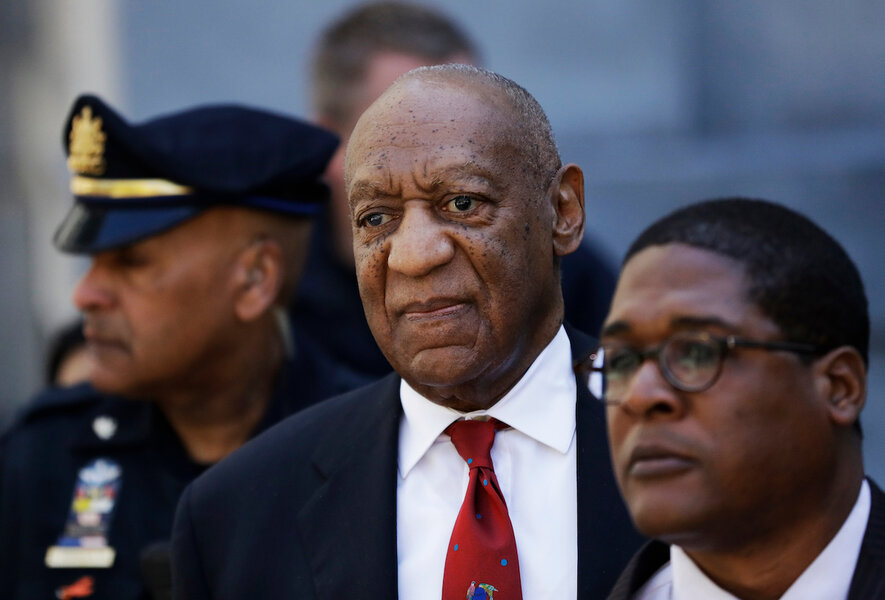Court overturns Bill Cosby's sexual assault conviction
Loading...
| Philadelphia
Pennsylvania’s highest court overturned Bill Cosby’s sex assault conviction Wednesday after finding an agreement with a previous prosecutor prevented him from being charged in the case.
Mr. Cosby has served more than two years of a three- to 10-year sentence at a state prison near Philadelphia. He had vowed to serve all 10 years rather than acknowledge any remorse over the 2004 encounter with accuser Andrea Constand.
He was charged in late 2015, when a prosecutor armed with newly unsealed evidence – Mr. Cosby’s damaging deposition from her lawsuit – arrested him days before the 12-year statute of limitations expired.
The court said that District Attorney Kevin Steele, who made the decision to arrest Mr. Cosby, was obligated to stand by his predecessor’s promise not to charge Mr. Cosby when he later gave potentially incriminating testimony in Ms. Constand’s civil suit. There was no evidence that promise was ever put in writing.
Justice David Wecht, writing for a split court, said Mr. Cosby had relied on the former prosecutor’s decision not to charge him when he later gave potentially incriminating testimony in Ms. Constand’s civil suit.
They said that overturning the conviction, and barring any further prosecution, “is the only remedy that comports with society’s reasonable expectations of its elected prosecutors and our criminal justice system.”
Mr. Cosby, who was once beloved as “America’s Dad,” was convicted of drugging and molesting the Temple University employee at his suburban estate.
The trial judge had allowed just one other accuser to testify at Mr. Cosby’s first trial, when the jury deadlocked. However, he then allowed five other accusers to testify at the retrial about their experiences with Mr. Cosby in the 1980s.
The Pennsylvania Supreme Court said that testimony tainted the trial, even though a lower appeals court had found it appropriate to show a signature pattern of drugging and molesting women.
Mr. Cosby was the first celebrity tried and convicted in the #MeToo era, so the reversal could make prosecutors wary of calling other accusers in similar cases. The law on prior bad act testimony varies by state, though, and the ruling only holds sway in Pennsylvania.
The justices voiced concern not just about sex assault cases, but what they saw as the judiciary’s increasing tendency to allow testimony that crosses the line into character attacks. The law allows the testimony only in limited cases, including to show a crime pattern so specific it serves to identify the perpetrator.
In New York, the judge presiding over last year’s trial of movie mogul Harvey Weinstein, whose case had sparked the explosion of the #MeToo movement in 2017, let four other accusers testify. Mr. Weinstein was convicted and sentenced to 23 years in prison. He is now facing separate charges in California.
In Mr. Cosby’s case, one of his appellate lawyers said prosecutors put on vague evidence about the uncharged conduct, including Mr. Cosby’s own recollections in his deposition about giving women alcohol or quaaludes before sexual encounters.
“The presumption of innocence just didn’t exist for him,” Jennifer Bonjean, the lawyer, argued to the court in December.
In May, Mr. Cosby was denied parole after refusing to participate in sex offender programs during his nearly three years in state prison. He has long said he would resist the treatment programs and refuse to acknowledge wrongdoing even if it means serving the full 10-year sentence.
This is the first year he was eligible for parole under the three- to 10-year sentence handed down after his 2018 conviction.
Cosby spokesperson Andrew Wyatt called the parole board decision “appalling.”
Prosecutors said Mr. Cosby repeatedly used his fame and “family man” persona to manipulate young women, holding himself out as a mentor before betraying them.
Mr. Cosby, a groundbreaking Black actor who grew up in public housing in Philadelphia, made a fortune estimated at $400 million during his 50 years in the entertainment industry. His trademark clean comedy and homespun wisdom fueled popular TV shows, books, and standup acts.
He fell from favor in his later years as he lectured the Black community about family values, but was attempting a comeback when he was arrested.
“There was a built-in level of trust because of his status in the entertainment industry and because he held himself out as a public moralist,” Assistant District Attorney Adrienne Jappe, of suburban Montgomery County, argued to the justices.
Mr. Cosby had invited Ms. Constand to an estate he owns in Pennsylvania the night she said he drugged and sexually assaulted her.
Ms. Constand, a former professional basketball player who worked at his alma mater, went to police a year later. The other accusers knew Mr. Cosby through the entertainment industry and did not go to the police.
The AP does not typically identify sexual assault victims without their permission, which Ms. Constand has granted.
This story was reported by The Associated Press.







